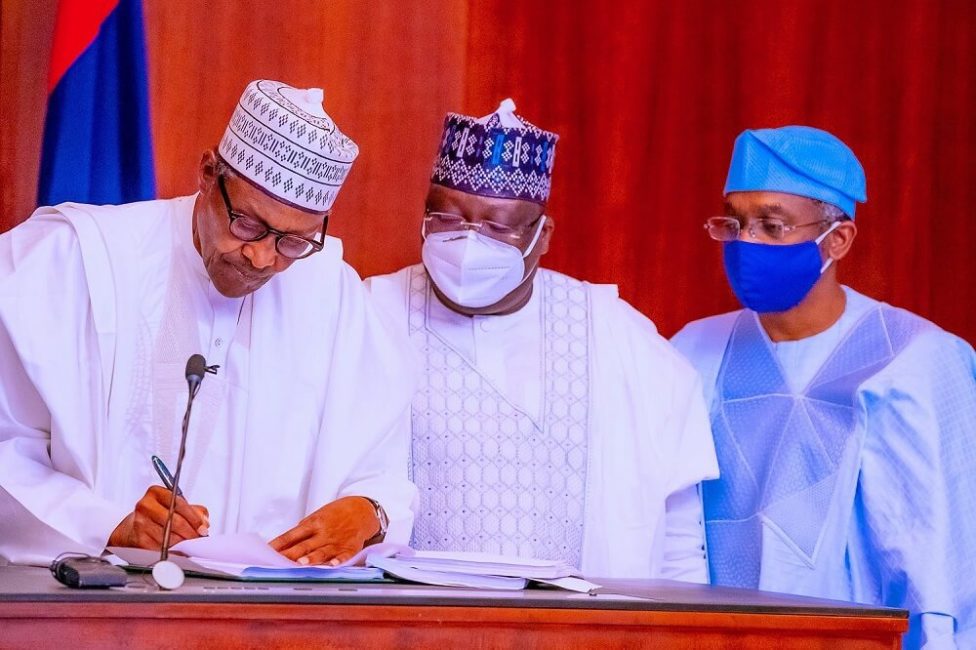11 Key Clauses In Electoral Act 2021 That Will Impact 2023 Elections
There are 11 clauses in the Electoral Bill signed into law on Friday by President Muhammadu Buhari that would impact the 2023 and future elections in the country.
Who’s Qualify To Sue Candidates?
Advertisement
One of the profound provisions of the Bill just signed into law is the amendment to Section 31(5) of the Electoral Act.
While the previous Act reads, “Any person who has reasonable grounds to believe that any information given by a candidate in the affidavit or any document submitted by that candidate is false may file a suit at the Federal High Court, High Court of a State or the FCT (Federal Capital Territory) against such a person seeking a declaration that the information contained in the affidavit is false,” the new Act reads, “Any aspirant who participated in the primaries of his political party who has reasonable grounds to believe that any information given by his political party’s candidate in the affidavit or any document submitted by that candidate in relation to his constitutional requirements to contest the election is false, may file a suit at the Federal High Court against that candidate seeking a declaration that the information contained in the affidavit is false.”
With the provision now in full force, other Nigerians apart from aspirants are precluded from challenging the credentials of candidates of any political party.
Although this has been reaffirmed by several court judgments, it therefore means that if any candidate is unaware of any candidate’s certificate defect, he remains unchallenged unless his opponent is told of such infractions.
Advertisement
New Act Sets Timetable For INEC Funding
The new electoral act provides for adequate and timely release of funding for elections.
Clause 3(3) of the bill provides that all funding required for a general election is released not later than one year before the general elections.
Based on the clause, the funds for election must not be released not later than the eve of the year of election.
According to the lawmakers, this is to help the electoral body to prepare well in advance.
Advertisement
Electronic Transmission And Timely Election Results
The new electoral act provides for real time election results as contained in Clause 50, meaning any election result released outside the stipulated time stands invalid.
This is based on electronic transmission of results although it’s not cast in stone for INEC to electronically transmit election results, it provides for it as an alternative to help quicken election result releases, a system INEC has adopted in two elections already.
INEC Can Review Election Results
Clause 65 of the electoral bill empowers INEC to evaluate declarations and returns made under dubious circumstances.
This clause was inserted to correct the situation where results are declared under duress as witnessed in some recent elections.
Advertisement
In this clause, the measure will radically alter the results management process, discouraging politicians from pressuring electoral agents to declare manufactured election results that can only be disputed in court.
Political Neutrality
Clause 8(5) was inserted to ensure political neutrality of INEC’s personnel.
The section excludes politicians or members of political parties from becoming INEC officials.
The Clause provides for punishment that must be meted out to INEC officials with political affiliations.
Anyone who flouts the law as contained in the clause commits an offence and is subject to a fine of N5,000,000 or imprisonment for a term not exceeding two years, or both, if convicted.
Electronic Voter Accreditation Only
In the 2019 election, the conduct of the election witnessed sporadic process where voters were accredited without the use of smart card reader.
Therefore, Clause 47 of the electoral bill allows voters to be electronically accredited using Smart Card Readers or any other technical equipment determined by INEC. Election results declared without following the process would be invalid.
Persons With Disability Must Vote
The new electoral act provides that Persons with Disabilities must be allowed to vote if so registered and show up for voting.
Therefore, through Clause 54 (2), it compels INEC to ensure that persons with disabilities, special needs, and vulnerable people are assisted at polling places by providing appropriate means of communication, such as Braille, large embossed print, electronic devices, sign language interpretation, or, in appropriate cases, off-site voting.
The clause did not however state what happens if these conditions are not met.
Over voting
In previous elections, over-voting was not considered essential as to influence election results, with the returning officers turning blind eyes.
However, in Clause 51, INEC is compelled to ensure that all votes cast must not be above the total number of votes expected at the polling units.
It states that the “total number of accredited voters” will become a deciding factor in the election’s legality,” therefore, the influence on the outcome of the election shall only be considered based on the number of voters accredited.
Early Conduct Of Party Primaries
This is redefined in the new amendment to the bill with Clause 29(1) of the 2022 electoral bill, enjoining each political party to submit its list of candidates to INEC from lawful conduct of primaries not later than 180 days (6 months) before election day.
New Window For Campaigns
Clause 94 of the electoral bill gives new window for political parties’ public campaigns.
It extended campaigns from 90 to 150 days before polling day and will finish 24 hours before that day.
Substitution Of Candidate Due To Death
Clause 34 allows political parties to hold primary elections to replace a candidate who dies after the polls have begun but before the final results are announced and a winner is declared.
In the case of legislative elections, the election will be re-run, and a bereaved political party can have a new primary within 14 days to nominate a new candidate.
Concerning presidential and governorship elections, the deceased candidate’s running mate will continue the election and select a running mate.



